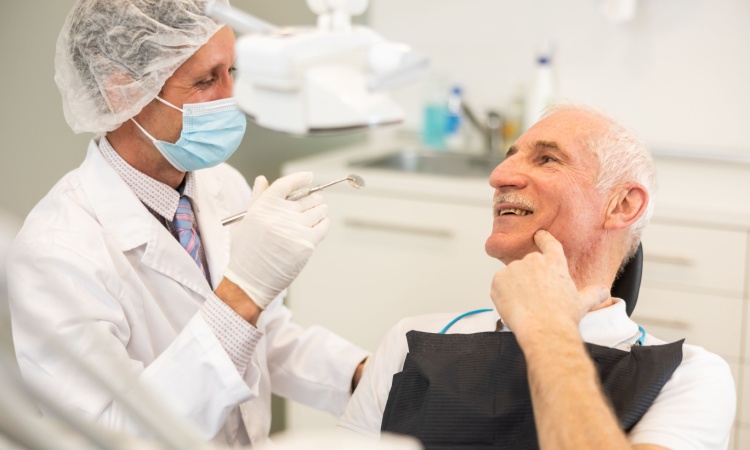
What Are Dental Implants (Tooth Implants)?
Dental implants are a way to replace missing teeth with something that looks and feels natural. They’re made up of two main parts: a small metal post that’s placed into your jaw, and a crown that sits on top and acts like the visible part of your tooth.
The post acts like a tooth root. Over time, it bonds with the bone in your jaw, helping keep everything stable. Once it’s healed, the dentist attaches a crown that’s shaped and coloured to match your other teeth. The result is a tooth that doesn’t move, doesn’t need to be taken out, and works like the real thing.
For seniors, implants can make eating, speaking and smiling feel easier again. They’re a great option if you’ve lost one tooth, several teeth, or even all your teeth and want a more secure solution than dentures. They also help stop the jawbone from shrinking, which can happen after tooth loss.
Implants do involve a surgical procedure and some healing time, but for many older Australians, they’re a long-term fix that makes daily life more comfortable.
Types of Dental Implants
If you're looking into dental implants, the first thing to know is that there are a few different types. The right one for you depends on how many teeth you’re replacing and what kind of result you’re after. Here are your three main options.
Single-Tooth Implants
This one’s pretty straightforward. If you're missing just one tooth, a single implant fills the gap without touching the teeth around it. Your dentist places a small metal post into your jaw, then tops it with a custom crown that looks and feels like the real thing. It’s a good long-term fix if everything else in your mouth is in good shape.
Implant-Supported Bridges
If you're missing a few teeth in a row, your dentist might suggest a bridge. Instead of placing an implant for every missing tooth, they place two implants (or sometimes more) to hold a row of teeth in place. It’s strong, it feels secure, and it usually costs a bit less than replacing each tooth individually.
Implant-Supported Dentures
This option is often recommended if you’ve lost most or all of your teeth. A few implants are placed in your jaw, and a full or partial denture clips onto them. It’s way more stable than regular dentures, so you don’t have to worry about slipping when you talk or eat.
No matter which option you’re considering, your dentist can walk you through what will work best for your mouth and budget. And if you’ve got private health insurance, it’s worth checking if major dental cover includes any part of the cost.Typical Cost of Dental Implants for Seniors in Australia
Dental implants aren’t cheap. But if you’re dealing with missing teeth and want a solution that feels solid, long-lasting, and comfortable, many people find the investment is worth it.
Here’s a rough idea of what dental implants cost in Australia, based on current figures from local dental clinics.
- Single-tooth implant: Around $4,000 to $6,500 per tooth
- Implant-supported bridge (replacing 3–4 teeth): Roughly $8,000 to $12,000
- Implant-supported dentures (full arch): Anywhere from $15,000 to $30,000+ per arch
A few things can push the price up or down:
- Type of implant (single vs multiple vs full-mouth)
- Materials used (titanium is standard, but some people choose zirconia)
- Your location (city clinics are often pricier than regional ones)
- Your dentist’s experience (highly experienced or specialist providers may charge more)
- Extra treatments (you might need scans, bone grafts or tooth removal beforehand)
It’s a good idea to get a full quote before committing, including any extra work that might come up during treatment. Many dentists will also give you a written treatment plan that you can take to your health fund to check what’s covered.
Comparing Dental Implant Costs: Australia vs Overseas
You’ve probably heard of people flying overseas to get dental work done. It’s called dental tourism, and for some, it’s a way to save money on big procedures like dental implants. Popular spots include Thailand, Bali, and the Philippines, where clinics often advertise much lower prices than what you’d pay in Australia.
A single dental implant overseas might cost anywhere from $1,500 to $2,500, compared to $4,000 to $6,500 here in Australia. Full-mouth implants, which can run $30,000 or more locally, are sometimes quoted at half the price in overseas clinics.
At first glance, it seems like a huge saving, but there are a few things to think about, especially for seniors.
- Follow-up care: If anything goes wrong or you need adjustments, you may need to fly back. That adds time, cost, and stress.
- Aftercare: Healing takes time. Most Australian dentists want to see you for check-ups after the surgery. Overseas clinics often don’t offer that kind of follow-through.
- Quality and safety: Some overseas clinics are excellent. Others are not. You might not get the same level of regulation, sterilisation, or experience as you would at home.
- Travel stress: Long flights, unfamiliar hospitals, language barriers – it can be a lot to manage when you’re also recovering from oral surgery.
- Health complications: Seniors with other health concerns (like diabetes or heart conditions) should always talk to their GP before planning surgery overseas.
While dental treatment abroad might be cheaper upfront, it’s important to weigh the risks and consider the full cost, including any follow-up care you might need once you’re back home.
If you’re unsure, start by speaking to a local dentist for a quote, and compare that with what’s available overseas. Some Australian clinics also offer payment plans, which can make local treatment more manageable without the need to travel.
Does Medicare Cover Dental Implants?
In most cases, Medicare does not cover dental implants. That includes the surgery, the implant itself, and the crown that goes on top. These are considered private treatments and fall outside what Medicare pays for.
Medicare is designed to cover things like visits to the GP, hospital care, and some essential health services, but dental care isn’t fully included. The only exception is if the dental problem is tied to a medical issue that’s being treated in a public hospital. Even then, it’s rare for implants to be covered.For seniors, this can come as a surprise, especially if you’re used to bulk billing for other healthcare services. Unfortunately, free dental implants aren’t available through the public system.
There are some government-funded dental programs for eligible seniors, including public dental services through state and territory health departments. These can cover check-ups, fillings, and extractions, but not dental implants.
If you’re hoping to get help with the cost, you’ll need to look at private health insurance with major dental cover, or explore other options like payment plans, dental schools, or community clinics that offer reduced rates.
What Do Health Deal’s Partner Funds Cover for Dental Implants?
If you're considering dental implants, your private health insurance can make a big difference to what you end up paying out of pocket. While Medicare doesn’t cover implants, some private health funds include them under major dental, but coverage, limits and waiting periods vary.
Here’s a quick look at what’s offered by Health Deal’s partner funds when it comes to dental implants. Just remember, with all funds, you’ll need to check things like waiting periods (usually 12 months for major dental), annual or lifetime limits, specific item numbers covered and whether your dentist offers gap-free options.
Bupa
Bupa can help with the cost of dental implants under “major dental” extras cover (which means they’re not included in basic or general dental policies). The higher your level of cover, the more you may be able to claim. In some cases, Bupa may also require you to have combined hospital and extras cover, especially if you're on a family plan or a package deal.
AHM
Implants are included under AHM’s Choosable 50 and Choosable 60 Teeth/Wellbeing policies. These give you a percentage back, up to 60% of the cost, depending on your cover and annual limit. There’s usually a 12-month waiting period before you can claim for implants. You’ll also have an annual limit. For example, Choosable 60 has a combined limit of $800 per person for major dental and a few other services. You’ll likely still have some out-of-pocket costs, but this cover can help bring the overall price down.
NIB
NIB covers dental implants under certain extras policies that include major dental. NIB also has Dental Care Centres and a First Choice network of dentists. If you go to one of these providers, you might pay less, as they offer agreed pricing for NIB members. Even with cover, expect some out-of-pocket costs.
Westfund
Westfund covers dental implants under extras policies with major dental. Ultimate Extras offers the highest benefits, with up to $1,500 per person depending on the item. High Extras Over 50s includes implants under a $1,600 combined limit, while Choice Extras pays around 50% of the cost, up to $800 per year. Athlete Guard Extras also includes implants with fixed yearly limits. You’ll still have some out-of-pocket costs, but using a Westfund Provider of Choice may help reduce these costs.
Australian Unity
Australian Unity covers dental implants under major dental in extras policies like Premium Dental Plus and MaxiCare Extras. You can usually claim back around 80% of the cost, up to your annual limit. Premium Dental Plus starts at $1,500 per person, increasing each year, while MaxiCare Extras offers $750 per person per year. There’s a 12-month waiting period for implants, and while basic services may be gap-free, major dental still comes with out-of-pocket costs based on your provider and limits.
HIF (Health Insurance Fund of Australia)
HIF may cover dental implants through both hospital and extras cover. If the surgery is done as a hospital inpatient and has a Medicare item number, hospital costs like theatre and accommodation may be covered under Bronze Hospital or higher. For the implant itself, you’ll need major dental extras cover. Top Extras and Special Options pay set dollar amounts per item, with limits that increase the longer you’re with HIF (e.g. from $600 to $1,100 over five years). A 12-month waiting period applies, and you might need to pay some out-of-pocket costs.
If you’re unsure which policy includes what, a quick chat with a Health Deal insurance specialist can help you sort through the fine print and find a policy that fits your needs and budget.
Dental Implant Coverage by Non-Partner Health Funds
If you're with a health fund that isn’t part of the Health Deal partner network, you might still get some help covering the cost of dental implants, but it really depends on your policy.
HCF offers cover for dental implants under some extras policies that include major dental. The rebate is usually a set dollar amount per item, and you’ll need to serve a waiting period before you can claim.
Medibank includes dental implants in a few of its extras covers, again under major dental. They usually pay a percentage of the cost, up to a yearly limit. What you get back depends on your level of cover.
Frank Health Insurance has extras policies where major dental is included. Implants may be covered, but limits and waiting periods apply, so it’s worth reading the fine print or calling the fund to be sure.
HBF also offers cover for implants under its major dental extras. How much you can claim depends on your policy and how long you’ve been with them. You’ll usually get a fixed amount per calendar year.
Just remember, every fund’s offering is different. If you’re not sure what your current policy includes, it’s worth checking your policy booklet or giving your fund a call before starting treatment.
Financial Assistance Alternatives for Dental Implants
If your private health insurance doesn’t cover enough, or you don’t have it, there are still ways to make dental implants more affordable.
Many dentists offer interest-free payment plans, letting you pay in smaller instalments. Some dental schools also offer lower-cost treatment from supervised students, though spots are usually limited. Community dental clinics may not offer implants, but they can help with assessments or referrals, especially if you have a Pensioner Concession Card or Seniors Health Card.
You can also look into dental discount programs, which offer reduced rates in exchange for an annual fee. These aren’t insurance, but they can still help lower costs for major work.
It’s often worth speaking with your dentist or checking with your state’s public dental service to see what’s available near you.
Some Dental Implant Risks & Safety Considerations
Dental implants are generally safe, even for seniors, but a few health factors can affect how well they work. If your jawbone is weak or has shrunk, you might need extra prep like a bone graft. Healing can also take longer if you have conditions like diabetes or are on certain medications.
Problems like infection or poor healing are rare, but they can happen. That’s why it’s important to see an experienced dentist and follow their aftercare advice closely.
If you’re thinking about implants, start with a proper consultation. A good dentist will explain the pros and cons clearly, check that the treatment is right for you, and make sure everything’s done safely.
Choosing the Right Health Insurance for Dental Implants
If you’re planning to get dental implants, it’s worth checking whether your extras policy includes major dental, as this is where implant cover usually sits. Policies that only cover general dental won’t help with the cost.
Look at your yearly limits, how your fund pays (either a fixed amount or a percentage), and whether there’s a 12-month waiting period. You’ll also want to ask if your insurer works with no-gap providers for major dental.
Comparing policies can feel overwhelming, but a health insurance specialist can help you find cover that includes implants and explain how much you’re likely to get back.
Compare Providers Today
Finding the right private health cover for dental implants starts with understanding your options. If you’re not sure what kind of cover you need, our Health Deal Insurance Comparison tool can help. You can compare a wide range of health insurance plans, pricing, and provider features side by side.
Need personalised support? You can speak directly with a Health Deal insurance specialist for expert guidance. We’ll help you compare policies, explain key differences, and recommend options that fit with your health needs and budget. Call 1300 369 399 or email enquiries@healthdeal.com.au.
Disclaimer
This guide is for informational purposes only and should not be taken as medical or financial advice. Health Deal is proud to partner with a range of health insurance providers. While we strive to provide accurate and up-to-date information, health insurance policies and benefits may change. Always check with a financial professional before making any decisions. Health Deal compares selected products from a panel of trusted insurers but does not compare all products in the market. For the most current information, please refer to your chosen health fund’s official website or speak with one of our health insurance experts.


 Single
Single Couple
Couple Family
Family Single Parent
Single Parent